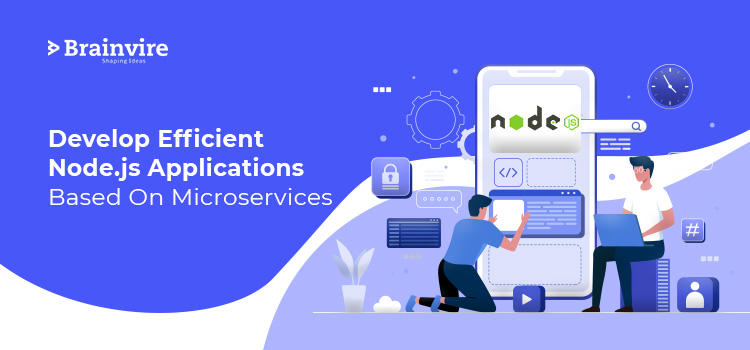
Due to high-end features, Node.js is gaining remarkable popularity in this rapidly evolving app development industry. It has enabled top-line companies to craft highly scalable and flexible mobile applications. While incorporating microservices in Node.js app development, it triggers the entire project workflow which as a result delivers the perceptible outcome.
How?
This will be answered prominently in this blog. You’ll learn how Node.js app development takes place with the help of microservices. But before that, let us throw some light on Node.js and Microservices.
Node.js
Node.js is neither a framework nor a programming language. It is an open-source, cross-platform, back-end javascript runtime environment that runs the application in V8 (execution engine) and executes beyond browsers. Node.js is a single-threaded language, designed with real-time, push-based architecture and is primarily used in web applications, mobile apps, for providing backend-API services. Some of the corporates that use Node.js technology are GoDaddy, Linkedin, IBM, Netflix, Microsoft, and Paypal.
Microservices
Microservices are applications that are broken down into smaller and lightweight chunks on the basis of the logical construct. The node microservice framework consists of an independent set of microservices, which are easily testable, maintainable, and deployable. When an application is deployed, these individual services get dispersed within a set of machines. These machines in the service fabric landscape are known as “clusters” in the service fabric. This node.js microservice architecture approach allows developers to embrace compact and specialized tools that get each job done properly
What was the need for Microservices in Application Development?
Making any changes in the application is a slow and tedious process, impacting the entire system. In a monolithic system, small modifications to the code may require the removal or addition of multiple code blocks, resulting in the creation and deployment of an entirely new version of the software. Partnering with an AEM development company can help streamline digital experiences and modernize system architecture for greater efficiency. Scaling specific functionalities or components of an application could also mean scaling the overall system.
Apart from the above-mentioned challenges, there are a few more:
- Difficult to build using different technologies
- If one feature goes out of order, the entire system goes out of order
- It is highly unscalable, every time the system requires updating, it has to be rebuilt.
- Not at all appropriate for any continuous development
- Each feature is built individually, one after the other, which makes the process extremely slow
To resolve and eliminate these challenges, the concept of the node microservices framework came into the picture. Microservices build an application that is basically a suite of small services, each one having a well-defined role and runs in its own process, and deploys independently. Each microservice can be independently deployed, upgraded, scaled, and restarted of all the sibling services in the application. They are typically managed by an automated system, making it possible to deploy frequent updates to live applications, without affecting the end-users.
Why is Integration of Node.js and Microservices necessary?
Applications that are microservice-based and developed in Node.js deliver a wide range of benefits.
Increased Productivity
Node.js consists of a package manager that comes with various modules, which are used in the development process by developers. In the software development process, having this manager means you’re saving a lot of time and effort. The coding involved in developing Node.js apps is highly understandable for front-end developers which enables them to make necessary changes.
One language can be used for the entire system. Developers can use the very same modules for the backend as well as the front-end purposes. This allows them to conserve an ample amount of time, leveraging productivity in the processes.
Easier Maintenance and Updates
Maintaining an application is a simpler process, there is no need of including complex monolithic code in the way. Developers are able to write a new application feature in a much more streamlined manner. Even in the case of updates, they can revamp the entire system with a progressive approach, instead of having to invest more time in rewriting. Node supports this approach as the application receives a modular and service-oriented structure.
Performance and Reliability of Applications
Highly robust applications can be built in this increasingly digitized arena. Qualified developers with good knowledge and ability can offer a great deal of better performance and reliability of the application. For Node.js development company, developers can create powerful applications and have an easy scope to upscale or downscale features, as needed. In this scenario, the focus is on a single-threaded, asynchronous microservices architecture.
Seamless Workflow Development
A project workflow can be easily simplified without having developers modify their tasks. Rather, they could work on the various portion of the developed application. One of the biggest advantages of having Node.js is that it can streamline the workflow process.
Data Replication
For microservices to incorporate appropriately with Node.js, data replication is necessary. Developers could benefit from the NoSQL databases without nursing their heads into the traditional database model.
Conclusion
As you can likely guess from the preceding information that Node.js works the best with microservices. Node.js developers have experienced some tangible outcomes and effective application productions after implementing microservices into Node.js app development. Node.js microservices allow developers to work with ease, hassle-free app scaling, and cost-controlling in heavy volume traffic.
Many innovative Node.js development companies and Node.js consulting firms utilize this smart combination of Node.js and microservices to achieve a large amount of productivity and high performance with lowered costs.
Related Articles
-
Socket.io: Create Ultra-Fast & Modern App with Node.js Framework
Talking About Socket.io: Create Ultra-Fast & Modern App with Node.js Framework, “The huge chunks of data that is transformed over multiple channels within a fraction of seconds is highly unprecedented”
-
Node JS vs Deno: Find Your Perfect Solution for Mobile Banking App
Deno is an emerging orb on the JavaScript realm and individuals assume that it will stamp out Node.js. However, when it comes to the finance industry, you need money management
-
Why Should You Use Node.js for Your Application
Talking About Why Should You Use Node.js for Your Application, Waiting for your order on the same counter at which you have ordered is annoying for both you and the



